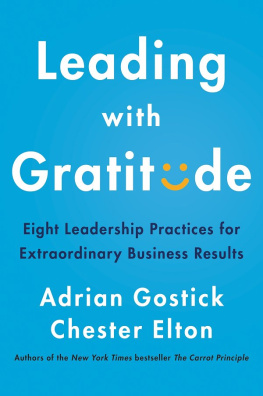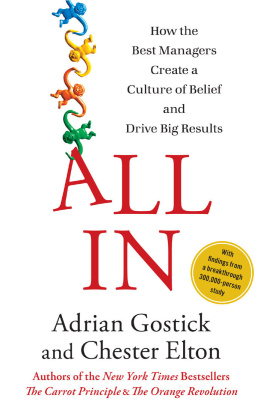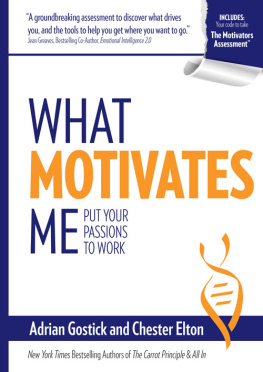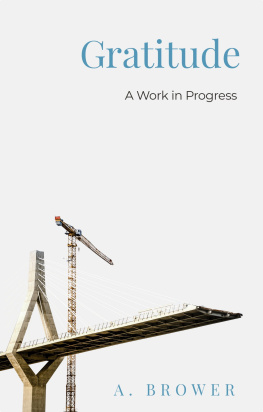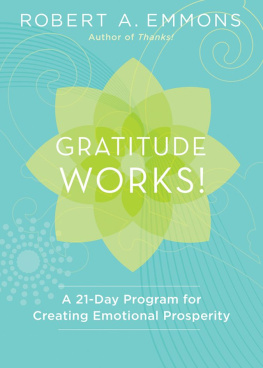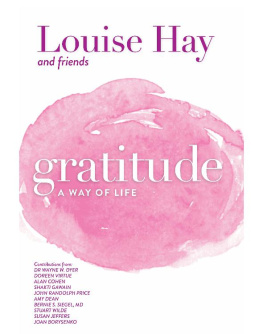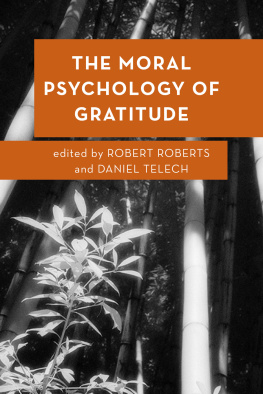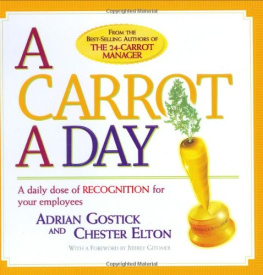To Marshall Goldsmith, who made this book possible
Contents
I have flown eleven million miles on American Airlines alone, not to mention one million on British Airways. The airplane is a fascinating place to watch people become agitated over factors they cannot hope to impact. One trigger that makes a lot of people crazy is the announcement that the airplane is going to be late.
Every time I hear that particular announcement, I remember a picture in my librarya picture of me on a volunteer trip to Africa with the Red Cross when I was about thirty years old. With me are many starving children whose arms are being measured. If their arms were too big, they did not eat. If their arms were too small, they did not eat. Their arms had to be just the right size, meaning they were not too hungry to survive and not too well fed so as not to need food. Their arm size determined whether they would eat that day.
I will never forget that experience. It reminds me daily of how fortunate I am. When I feel justifiably upset, I remember those beautiful children. I repeat this mantra over and over in my mind: Never complain because the airplane is late. There are people in the world who have real problems. They have problems you cannot even begin to imagine. Be grateful. You are a very lucky man. Never complain because the airplane is late.
I hope that someday this story helps you turn a moment of pain and anger into a moment of gratitude and joy.
Lots of people struggle with a lack of gratitude. And everyone Ive ever metwhether a janitor or a billionairewants a happy life. No matter who you are, you can easily look for happiness in the wrong place. The great Western disease is Ill be happy when. When I make a certain amount of money, get an award, or complete some task, Ill be happy.
What we can all learn is how vital gratitude is for our happiness. The wisest and happiest people I have metThich Nhat Hanh, the Dalai Lama, and otherstalk about, and practice, deep gratitude. What I notice when I talk with them is how freely they express it. Allowing yourself to feel deeply grateful is how you can do something bold. Be happy now. Not later.
As youll see in this amazing new book from Adrian Gostick and Chester Elton, gratitude is a mental state that a) you can most easily decide to feel, b) has the most immediate effect on improving your well-being, and c) is going to have a remarkable impact on your ability to lead other people. The challenge is to remember to do it!
Its important to create triggers in your work and in your life to remember to focus on gratitude. Thats what my friends Adrian and Chester introduce in this book. Their lessons are fun to read, on point, and relevant for every manager, parent, coach, spouse, or partner to be able to put gratitude to work in their work and their lives.
The key to a happy life isnt what people think. Its not wealth, fame, achievement, or even relationships. Its putting gratitude at the center of everything you do.
Life is good.
Marshall Goldsmith
Rancho Santa Fe
Chapter 1
The Gratitude Gap
It was 2008, in the midst of the global financial crisis, and WD-40 Company chief executive Garry Ridge was beginning to worry he might be coming down with something serious. As I toured our system, people kept asking me, Garry, how are you? I mean over and over. I was in my hotel room one night and lay there thinking: Is there a rumor Im not well?
Then an aha moment struck the Australian-born executive. It dawned on me: They werent asking how I was; they were asking how we were. They wanted confirmation that our company was okay.
Like in most workplaces at the time, fear was beginning to consume employees. Ridge told us, I decided, lets not waste a good crisis. Everywhere else our people would go theyd hear about the horror; when they came to work with us, they were going to hear about hope.
That would be a difficult task given the state of the economy, but Ridge greased the skids by communicating with his people daily. He put in place a policy of No lying, no faking, no hiding conversations. This would be one company, he said, that would not lay off a single person or give up a single benefit, and would actually up the investment in employee learning and development during the downturn.
Whats more, Ridge instructed his managers on how to lead with gratitude by showing them the benefits of regularly expressing sincere appreciation to their tribe.
Once Ridge made it known that leading with gratitude was something he valued and expected, his leadership stepped up their own efforts by seizing the day to acknowledge and appreciate employees for living the core values. A manager might publicly thank Mark for owning it by helping a client understand the myriad uses of a new product. Another might commend Lisa for aiding a teammate through a challenge, embracing the value of succeeding as a tribe. Managers began thinking of creative ways to help employees understand how they were contributing. The supply chain leader crafted a presentation that highlighted the vital ways his people were helping sustain the company economy, another value. Leaders were not only guided to pay attention to performances that exceeded expectations but also to look for the most fundamental contributions.
The result: In 2010, the company reported its best financials in its fifty-seven-year history. And the success has kept rolling. Over the next decade, the companys market cap has grown nearly 300 percent, and they have delivered a compounded annual growth rate of total shareholder return of 15 percent (all of which equates to millions fewer squeaky door hinges and an equal number of happy teenagers successfully sneaking back in after curfew!). Employee engagement is also off the charts, with 99 percent of tribe members saying they love to work there.
All that puts WD-40 Company in an elite group of organizations.
Says Ridge, Gratitude creates feelings of belonging. You and I have left an organization, even a relationship, because we didnt feel like we belonged. If our people know we are grateful, we are going to create an organization where they really want to come and give their best.
What leaders at this company discovered is the expression of gratitude for employees effortswhen the acknowledgment is authentic, specific, and timelycan be a huge motivation and productivity booster, especially during tough times. And yet while practicing gratitude is easy, it is one of the most misunderstood and misapplied tools of management. Thats a shame, because it is also one of the single most critical skills for managers to master if they want to enhance their teams performance and develop their leadership credibility.
We have devoted decades to teaching executives around the world how to be more effective, and helping them learn the art of gratitude has been central. We typically are not brought in to work with bosses who have, shall we say, a shortcoming when it comes to the social graces. No, most of these folks are thoughtful and are trying to be good leaders. In our studies, weve also observed thousands of managers in action and then talked with them about their views on leadership and how theyre trying to guide and motivate their people. Weve found few bosses are intentionally bullying or negligent when it comes to their people. Most also know that showing gratitude to their folks is championed as an essential part of good management. And yet again and again when we talk to their teams, we hear employees say they feel unappreciated. Some of them claim they actually feel under assault. Whats the deal?
Our research and that of others shows that there is a staggering gratitude deficit in the work world. In fact, a recent study found people are less likely to express gratitude at

